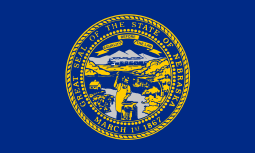Edgar Howard
| Edgar Howard | |
|---|---|
 | |
| Member of the U.S. House of Representatives from Nebraska's 3rd district | |
|
In office March 4, 1923 – January 3, 1935 | |
| Preceded by | Robert E. Evans |
| Succeeded by | Karl Stefan |
| 15th Lieutenant Governor of Nebraska | |
|
In office 1917–1919 | |
| Preceded by | James Pearson |
| Succeeded by | Pelham A. Barrows |
| Personal details | |
| Born |
September 16, 1858 Osceola, Iowa |
| Died |
July 19, 1951 (aged 92) Columbus, Nebraska |
| Political party | Democratic |
| Alma mater | Western Collegiate Institute, Iowa College of Law |
| Occupation | newspaper editor |
Edgar Howard (September 16, 1858 – July 19, 1951) was a Nebraska editor and Democratic politician. He was the 15th Lieutenant Governor of Nebraska and served six terms in the United States House of Representatives.
Early life and education
Edgar Howard was born in Osceola, Iowa on September 16, 1858. He attended the Western Collegiate Institute and Iowa College of Law. He worked as a reporter and editor for various newspapers until 1884, when he got a job as an editor for the Papillion Times in Papillion, Nebraska. After serving a term in the state house, he passed the state bar and set up a law practice in 1896 in Papillion.
Political career
Howard became involved in politics. He was elected to the Nebraska House of Representatives in 1894, serving to 1896. That year he was elected as probate judge of Sarpy County, Nebraska. Also that year he was a delegate to the 1896 Democratic National Convention.
In 1900 Howard ended his term as judge and purchased the weekly Telegram in Columbus, Nebraska. He published it for decades, expanding it in 1922 as a daily paper.
In 1917 Howard was elected as Nebraska's Lieutenant Governor, serving until 1919. He was elected as a Democrat to the Sixty-eighth United States Congress and to the five succeeding Congresses, serving from March 4, 1923 to January 3, 1935. During the Seventy-second United States Congress and Seventy-third United States Congress, he chaired the U.S. House Committee on Indian Affairs and was a co-sponsor of the Indian Claims Act, among other legislation. He was very concerned to end and even ameliorate what he described as "the staggering losses of Indian lands", and supported ending the allotment of communal lands.[1]
Howard lost his bid for re-election in 1934 to Karl Stefan. He ran again for his former seat in 1938 and lost to Stefan. Howard returned each time to running the Columbus Daily Telegram. He died in Columbus on July 19, 1951, and is buried in the Columbus Cemetery.
References
- ↑ 78 Cong. Rec. 11, pp. 726-32 (1934)
- "The Political Graveyard". Howard, Edgar. Retrieved January 26, 2006.
- "Congressional Bioguide". Howard, Edgar. Retrieved January 26, 2006.
- This article incorporates facts obtained from: Lawrence Kestenbaum, The Political Graveyard
- United States Congress. "Edgar Howard (id: H000836)". Biographical Directory of the United States Congress.
External links
| Wikiquote has quotations related to: Edgar Howard |
| Wikisource has original works written by or about: Edgar Howard |
- Edgar Howard papers at Nebraska State Historical Society
- A Christmas Vision, poem by Edgar Howard upon the death of his daughter, Martha.
| Political offices | ||
|---|---|---|
| Preceded by James Pearson |
Lieutenant Governor of Nebraska 1917 – 1919 |
Succeeded by Pelham A. Barrows |
| United States House of Representatives | ||
| Preceded by Robert E. Evans (R) |
Member of the U.S. House of Representatives from Nebraska's 3rd congressional district March 4, 1923 – January 3, 1935 |
Succeeded by Karl Stefan (R) |

